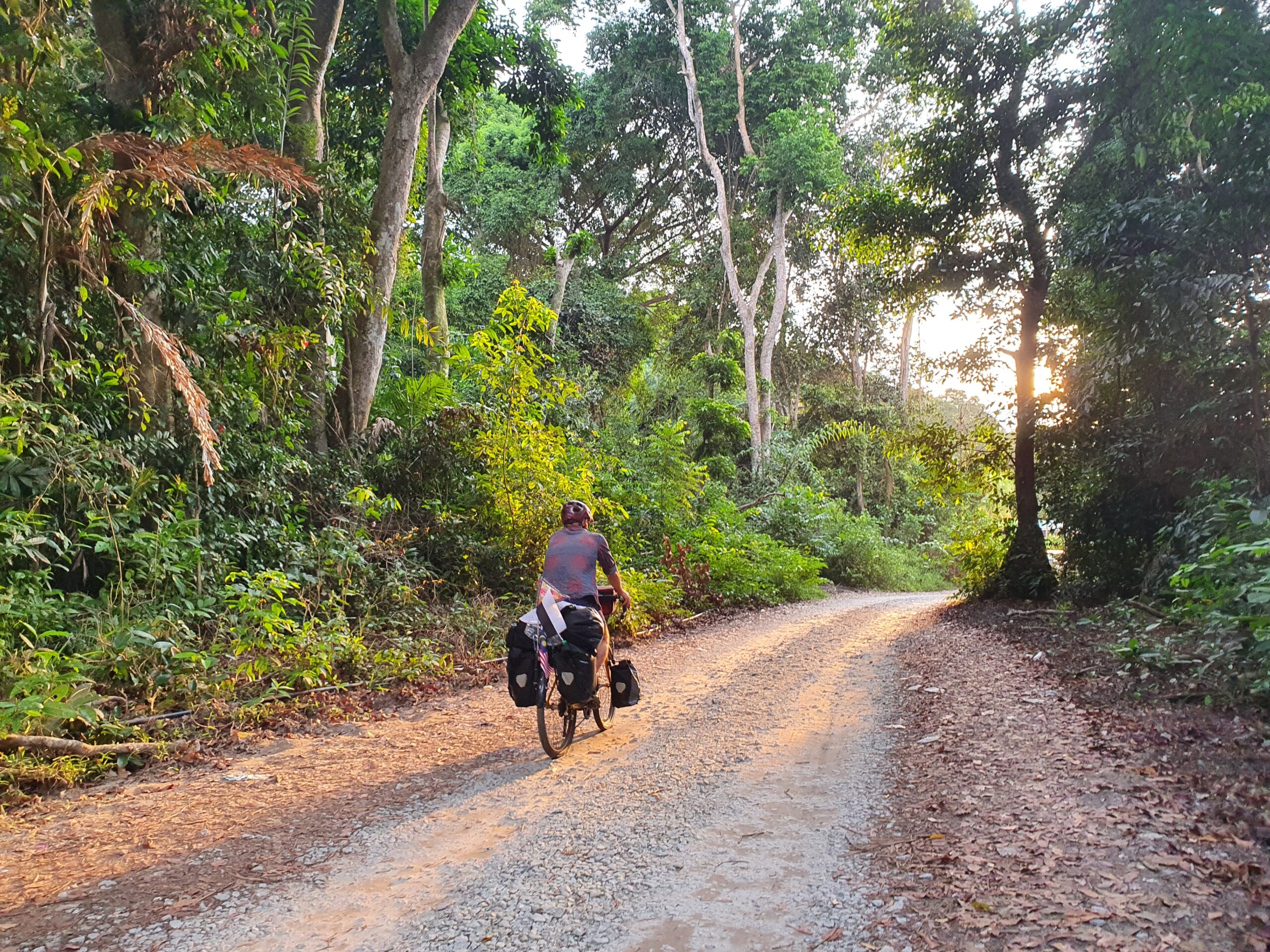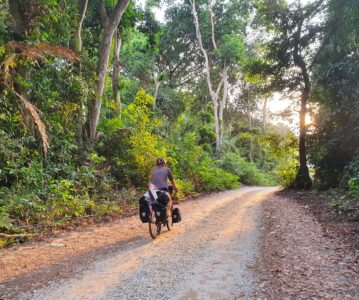We allow ourselves another day in and around Kuala Terengganu before we leave early in the morning for the next small snorkeling island. Here everything is a bit more relaxed than on the Perhentian Islands. No (domestic) tourist swarms, nobody who wants to attract us to a crossing with his ferry. Instead, the boatman leaves his motorcycle to Louie in a wonderfully uncomplicated way to quickly buy some fruit at the market before the small speedboat leaves the dock. Another afternoon passes with marveling at the underwater world, but unfortunately we decide to return to the mainland on the same day. We like this island much better than the much more touristy Perhentian Islands. Wild jungle covers the hilly inland, the perfect beaches are deserted, the clear water is full of colorful fish and the little tourist infrastructure is run by friendly, relaxed locals. We could have easily spent another day here!
In long, hot driving days we continue to pedal along the Malaysian east coast. Places to stay are usually easy to find; the local fishermen have no objection to us two cyclists stretching out their hammocks for a night, but surprise us with freshly caught and grilled fish, nice chats and benevolent acquiescence.
Our days start early, are interrupted by breaks to eat and drink and then usually end in a hot and humid afternoon somewhere on a beach in the hammocks and in the lukewarm sea water.
The road is mostly flat and fairly unspectacular. There is not much to see of the famous palm oil plantations in Malaysia; they are probably more inland or in the south. The hills towards the inland seem unbuilt and wild and often we are watched from the trees by small hordes of monkeys and occasionally hissed at.
The small beach mosques are still good places to go: The imams are each friendly, open-minded types who easily let us spend the night in the neighborhood or even in the courtyard of the mosque. Such places offer us some comfort: at the mosques there is always drinking water and “double u-C`s”, and often there is even the possibility to take a shower in a simple way. Everywhere there are shades or rain roofs and their columns are excellently suited to hang up our hammock-mosquito net constructions. At least I sleep excellently in my hammock. I even manage to sleep halfway on my side and my pregnant belly is comfortably supported. Louie is a mosquito net pro by now and with a few clips in the right place, this one does its job flawlessly.
After an AC room laundry night in the small town of Penang, where we once again fail to visit the possibly interesting local museum, we spend a somewhat creepy night next to the main road at a rest area. Creepy because there are no houses or residents far and wide and yet cars keep showing up. As long as they are families everything is in the green area, but if it is about groups of young men, the head cinema already begins to play a bad movie. In such a place, the invisible protective shield of the community falls away and casual criminals would have an easy time. The only thing that helps is to close your eyes, breathe calmly, think about the countless good experiences with the people here and reflect on the good in people. Also this night we are only disturbed by the noise of cars and nobody comes even close to our open air camp.
Several nasi ayams and hot hours on the bikes later, we arrive one fine evening at a small ferry port off the main road. Although there is a small jetty and something like a park with some food stalls on the stony shore, somehow the place doesn’t feel quite as convincing. After the various overnights at bathable beaches with raised, covered picnic islands, I guess our standards have risen a bit. The shallow shore here is not suitable for swimming and so we drive a bit up and down the road until the hoped-for miracle happens: “Do you want to come to a nice beach?”, two young women on a motorcycle call out to us. Oh yes, we want to! Fatima and her friend drive ahead and we follow them on a gravel path directly into the jungle. In the thicket we hear monkeys climbing through the treetops and the mosquitoes are not long in coming, but the forest opens up again and we find ourselves in a small bay. The crescent-shaped beach invites us to swim and thanks to the offshore islands and the shady trees on the shore, the place looks very inviting despite the garbage lying around. Fatima and her helpers are quickly at work: tomorrow is a public holiday and many day guests are expected. With large rakes, leaves and garbage are swept together and the resulting piles are ignited. Fatima runs a summer camp for school children here and soon we meet Hugo, the local kayak guide. We make ourselves comfortable under a tree and the evening passes with getting food, chatting, reading and swimming. The bay is also home to a happy horde of monkeys and a pack of wild boars. These cause quite a stir. The pig is not a commonly seen animal in Malaysia. Pork is not eaten for religious reasons and so no pigs are kept. Fatima later tells me that although the pigs are friendly, they are still a problem as devout Muslims may well be bothered by the “unclean” animal visitors.
At dusk, we venture into the area of the empty campground. Here we spied a covered concrete area, which is perfect as a place to sleep. We spend a quiet night and the campground operator, who shows up the next morning, smilingly wishes us a nice day, whether we also felt safe?
We start the day with the usual cold porridge by the sea and feel little desire for a quick departure. Today is national holiday and countless families from the surrounding area are trickling in. We enjoy the day among the picnicking and bathing Malaysians, chatting, dozing, reading and swimming. Just in time for our afternoon departure, a stately monsoon storm pelts us all. We save ourselves under Fatima’s covered lounge and stay for the next night. Another day dawns and today a training camp for a group of teachers is announced. So we leave Fatima’s camp and settle in once more on the beach. Another day passes. We have time and no reason to leave this beautiful place. There are nice people, toilets, showers, water and pleasant temperatures. We find food at the nearby ferry port at one of the food stalls. For the last night the camping and the lounge are occupied and Hugo offers us the terrace of his small hut.
Finally we force ourselves to leave and spend the next days with short day trips from bay to bay. At the city beach of Mersing we finally plunge into the Malaysian beach hustle and bustle for the last time. By car, one drives directly to the beach; some families come all the way from Kuala Lumpur for a weekend. Blankets, food baskets, gas stoves, kites and bubbles are unpacked, the kids are let loose with their sand toys, and the first round of sticky, iced drinks are brought in. For us, the drinks here have reached a level of sweetness that exceeds what is bearable. A great alternative is the fresh coconut water, which can be ordered without the two ladles of syrup added. The stall is bustling and countless families seem to be setting up camp for the night.
Soon we find out the reason for the density of people: The next morning a fishing competition takes place and the proud prize money of about 5000 US$ makes some hobby fishermen work a night shift. A good spot on the beach has to be secured in order to catch the biggest fish the next morning. The night on our covered wooden stand at the edge of a parking lot remains noisy and again and again we are directly illuminated by turning cars. This is not how we imagined our last beach night, but it is possible to sleep reasonably well even with noise and light.
Translated with www.DeepL.com/Translator (free version)


